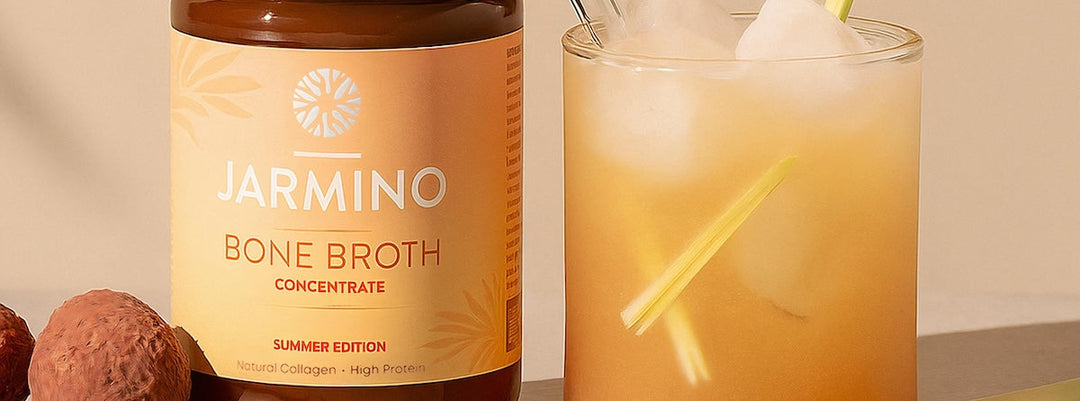Collagen is the most important structural protein of the human body; it is found in skin, hair, nails, joints and bones.
With increasing age (from about 25 years) the body's own collagen production decreases and collagen is gradually broken down.
The good thing about it is that you can supply your body with collagen from outside, e.g. in the form of organic bone broth or collagen powder.
Table of contents:
- How does collagen work in the body?
- Dosage and administration
- Collagen and the skin
- Collagen Hydrolysate
- Collagen for healthy joints
- What is collagen and what is it good for?
Collagen is good for smoother skin, functional joints, strong bones and a healthier intestine.
According to one study, the non-essential amino acid glycine contained in collagen can calm the nervous system and improve sleep quality.
There are different types:
Depending on where the collagen is found, different types of collagen are distinguished:
- Collagen type 1: In bones, skin, tendons, fascia, vessels and internal organs.
- Collagen type 2: In cartilage and in the vitreous body of the eye.
- Collagen type 3: In skin, uterus and blood vessels.
- Collagen type 4: In kidney glomeruli, basal lamina of epithelial and enotehelial cells, eye lens
- Collagen type 5: In basal lamina of muscle cells.
How does collagen work in the body?
Collagen causes the cells in the body to maintain their tension and yet remain elastic. This is the only way to keep the skeleton of joints, bones and connective tissue stable.
If there is a collagen deficiency, joints become stiff and the skin slackens.
This is how collagen works in the body:
- It protects the intestinal mucosa (Leaky Gut Syndrome) and thus prevents ulcers.
- It promotes the blood circulation of the heart, liver, kidneys and skeletal muscles.
- Reduces kidney injuries caused by toxins and drugs.
- It 'lubricates' the joints so that they function smoothly.
- It keeps the skin young and wrinkle-free.
Collagen & Hyaluronic Acid: A perfect pair
Like collagen, hyaluronic acid is not only found in connective tissue, but also in joints and cartilage.
Hyaluronic acid binds moisture so that moisture loss is counteracted. Together with collagen, which provides a stable structure of your skin, this is a good combination.
4 causes that promote collagen breakdown:
- As you get older, your body breaks down collagen on its own.
- Free radicals attack your collagen depot. Free radicals are caused by fine dust, excessive sunlight and smoking.
- A lack of vitamin E and coenzyme Q10, whose antioxidants can help keep your collagen strong.
- If a disease prevents your body from building and absorbing collagen, this can lead to a deficiency. This is often accompanied by a loss of vitamin C, which contributes to normal collagen formation.
Collagen-rich bone broths
Dosage and intake
In order to use the full power of collagen, you will learn here how long and how much collagen you should take.
You can take collagen daily, as your body cannot store this protein to fall back on in case of a deficiency. Your body processes this protein and stores it in joints, cartilage and connective tissue / skin.
You can take up to 10g (10 grams) of collagen a day to allow it to take its full effect in the intestines. This is because only about 10% of the collagen ingested reaches the intestine. You are welcome to try our chicken bone broth as a basis for your next meal.
Collagen and nutrition
Is your diet sufficient to cover your daily needs?
Or do you need to supplement collagen in addition to your healthy diet?
This is because modern nutrition has resulted in foods containing fewer nutrients than was the case 100 years ago.
Of all things, the components richest in collagen such as connective tissue and bones are no longer processed. Which is a pity, because collagen supports the production of hydrochloric acid in your stomach.
This makes it easier for you to digest food.
It can also help to repair the sensitive lining of the stomach and the small and large intestine.
If you do a lot of sports, for example, you need more natural collagen than you can get from your diet alone - as in JARMINO beef broth.
Natural collagen is in these foods
- Peppers, radishes, tomatoes, broccoli, turnips, carrots, sweet potatoes, cauliflower, onions, shallots, leeks and cabbage
- fish, hen's eggs - especially the yolk
- Bone broth
- Citrus fruits, kiwis, papayas
- Dark leafy vegetables (spinach, kale etc.)
- blueberries, strawberries, blackberries, raspberries
- White Tea
- Order Organic Collagen
Collagen skin
Smooth and stable skin needs collagen for the connective tissue to maintain its structure.
Collagen ensures smooth skin in humans
Collagen can reduce the depth of wrinkles and tighten the skin.
Since your connective tissue consists mainly of collagen, this protein not only supports a youthful appearance, but also strengthens your skin's immune defenses.
If you consume collagen, your skin's moisture level increases and also prevents wrinkles.
Collagen Hydrolysate
Collagen hydrolysate is water-soluble collagen produced by treatment with heat or acid and subsequent sterilization. Drinking collagen is therefore much easier.
Collagen hydrolysate penetrates into very deep skin layers because it has a high bioavailability. This ensures that your body can use it immediately. This is because collagen hydrolysate supports your body in building more cartilage and connective tissue.
Collagen for joints
Your bones, tendons and joints also need collagen to remain both stable and elastic.
The cartilage mass of your joints consists of 70% protein building blocks.
As the body builds up less collagen with age, the cartilage mass in the joints decreases. Then you hear it crack more often; because your joints are no longer as supple as in earlier years.
But when you take collagen, the cartilage mass increases and can store more fluid again, so the joint is elastic.
Collagen for strong muscles
When the bones lose their surrounding protective cartilage, they begin to rub. Bone spores develop and lead to the well-known pain - arthrosis.
For still unknown reasons, the body does not seem to produce enough new cartilage. This is known as osteoarthritis.
Clinical studies have shown that collagen can reduce pain in osteoarthritis patients with knee or hip pain, as their blood concentration of hydroxyproline (an important factor in collagen stability) increased.
The following ingredients can help with osteoarthritis:
Glucosamine and chondroitin sulfate promote cartilage health
Hyaluronic acid improves joint functions
Electrolytes (sodium, potassium and calcium) moisten and lubricate the joints
Collagen does not cause inflammation; unlike whey protein and soy protein.
In osteoarthritis, it can help to relieve the symptoms; by improving the immune system and protecting the joints from destruction.
Collagen-rich bone broth





